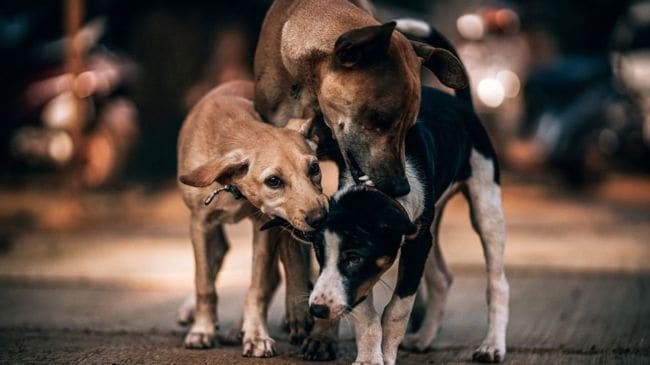Feeding Community Dogs: Balancing Constitutional Compassion with Public Order in India

- 23 Jul 2025
Context:
The issue of feeding stray or community dogs has evolved into a contentious legal and social debate in India. A recent case involving a Noida resident, allegedly harassed for feeding stray dogs in the common areas of her housing society, once again brought this matter to the judicial spotlight. While the Supreme Court refrained from issuing a specific directive, it observed that citizens should consider feeding strays within their own homes—an observation that, while not binding, reignited debate on reconciling individual compassion with community concerns.
Legal Framework: The ABC Rules, 2023
The Animal Birth Control (ABC) Rules, 2023, framed under the Prevention of Cruelty to Animals Act, 1960, serve as the primary legal instrument governing the care of community animals. These rules replaced the 2001 version and introduced the term “community animals” instead of “stray dogs,” recognizing them as territorial beings who coexist with human residents.
Rule 20 of the ABC Rules mandates that Resident Welfare Associations (RWAs) or local bodies must facilitate the feeding of community dogs if any resident voluntarily chooses to do so. Designated feeding spots must be located away from high-footfall zones like staircases, entrances, and children’s play areas. Cleanliness and fixed feeding times are essential requirements. Additionally, the Rules lay down a dispute resolution mechanism involving veterinary officers, police representatives, and local welfare groups.
Constitutional and Ethical Dimensions
The legal protection of animals finds support in Article 21 of the Constitution. In the 2014 Animal Welfare Board of India vs. A. Nagaraja case, the Supreme Court interpreted the right to life and liberty to include animal life. Further, Article 51A(g) enshrines the fundamental duty of citizens to show compassion to all living beings. Thus, feeding community dogs is not merely an act of personal kindness but a constitutional obligation.
The petitioner in the Noida case was arguably fulfilling this duty. Allegedly harassed by her RWA president—who reportedly destroyed water pots and killed sterilised dogs—she faced institutional apathy when authorities failed to act. Her appeal to the Allahabad High Court was dismissed, citing inconvenience to the "common man," despite the ABC Rules’ clear guidelines.
Judicial Precedents and Clarifications
Contrary to popular media interpretation, the Supreme Court in the current case did not issue an order compelling the petitioner to feed dogs at home. Observations made during hearings are not judicial directions. Notably, the apex court had earlier stayed a 2022 Bombay High Court (Nagpur Bench) order that banned public feeding and required adopters to take dogs home—asserting that such rules violate statutory rights and compassionate duties.
Conclusion
Feeding community dogs intersects with animal rights, public safety, and civic coexistence. The ABC Rules, 2023, strike a legal and ethical balance between compassion and community order. Sterilisation and designated feeding are not only humane solutions but also public health imperatives. Going forward, increased awareness, community dialogue, and strict adherence to legal norms are vital to avoid polarisation and ensure harmonious urban living.
